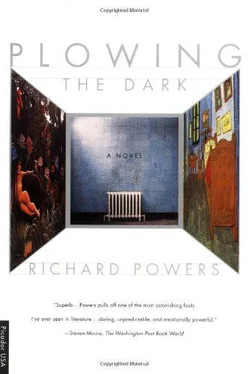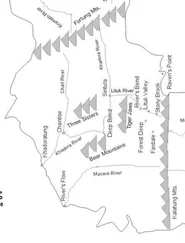She reads to you again from out of a book whose title, for all the years of your childhood, you thought was written in Arabic. But now, in photographic recall, you see it clearly enough to read off the stylized, flowing script: Saadi.
It was so; it was not so: there once was a slave who tried to alter his fate by running away from his master. But fate recaptured the runaway and sentenced him to a life of backbreaking work, building the master's mansion.
Many years later, a penitent appeared in the court of this master, knelt down, and pleaded. I am that slave who ran away from you, all that time ago.
The master listened to the news in horror. If you are my escaped slave, then who is the man whom I have sentenced to a lifetime of hard labor?
He sent for the innocent convict, a philosopher named Lukman. How can you ever forgive me? I have stolen your whole life.
But Lukman told the unhappy man, Do not apologize. For you have your new mansion, and I have learned the only lesson worth learning about life, one that I would never have learned had you not imprisoned me.
That is the message your mother sends you, from out of her bound volume, a quarter century ago. A fable she picked as preparation for the life that would one day take you hostage.
She tells you her favorite again, the story she always had to give you from memory, out of her best Farsi children's book, lost in the violence of repeated exiles. She improvises, embroiders by word of mouth, a deeper archaeology, the far-off lands even more suggestive in their state of ruin.
There was and there was not a great nature painter who painted a landscape so perfect it destroyed him. Each person who looked at the scene saw something different. But all saw envy, and all wanted what they saw. And those who wanted the painting most decided to kill the maker and steal the thing he made.
Each time she tells you, the story ends differently. Some trick of memory, either yours or hers. In one, the man's painted creatures warn him of the danger and foil the plot. In another, the painter's murder returns the beautiful landscape to overgrown weeds. In the ending that two small, stunned boys loved most, the painter evades his killers, who arrive at his house only to find the abandoned painting, now with a figure running through its farthest, faintest hills.
Death is not death, nor invention invention. Your single life replays all existence, the way your fetus quoted the fish it came from. All innocence, all mistakes, from your first frightened grunts to your late-night adult confusion, are yours again. All your moments condemn you to line them up and relive them, one by one. Your Enlightenment, your Dark Age, your puddled afternoons of Hundred Years' War. All times collapse into now, in the mind forced to a standstill.
She gave you a plant, once. Not your mother: the other one. A droopy, seductive, tropical thing. A peace offering she biked over and left on your stoop, after a bloody, five-day, knockdown standoff where neither of you would concede the other's terror. It thrived under your care for a good three months. After another patented spin-out, it began to wither. Its leaves burned back from their tips, as if torched by a butane lighter. Nothing you did helped. It limped along on critical. By chance it rallied, just before she started tentatively coming around again.
A couple more synchronized dips and recoveries convinced you: this plant marked the health of the relationship. A magic gift, a talisman out of a Persian book, it flourished so long as your love flourished, and would die, definitively, when love died. You and Gwen staggered to your battered finish, and the plant's leaves fell off completely, leaving just a few bald spikes to trim the afterthought of stem. You put the husk out in the garage and left it, refusing to recycle the soil or the pot. A year later, closing up shop before your move, you discovered it. It sat in its banishment behind a scrap of chain-link fence, putting out new growth in the dark. You went inside and called her. She sounded glad to hear from you. There followed the best three weeks of your life together, unscathed because faked, sheltered by your certain departure.
Even this fiction ended viciously, in mutual recrimination, with your quick exit. As you left, you transplanted the hothouse vine to that strip of dirt that passed for a garden on the north side of your apartment. The thing could not have made it past that next Chicago Columbus Day.
Here in this dark room, in the one unrepentant slit of light your sheet tin permits, that plant proliferates. Its jungle rises up around you. How has it grown so profuse, with so little care? How could it have reached such a canopy without your tending it?
The world goes simple, finally. Air, water, light, heat. Recalling or forgetting. Liking or not liking. Finishing the evening's meal or leaving it. You have not been beaten much. Not suffered pliers or electric prod, burns or mutilations, and so, vastly better off than most of the world's full storehouse of politicals. Your mind, for a few more weeks, is still a model time machine — kingdoms, wars, harems — running at any speed, forward and back.
You've gotten out and seen the world, had a glimpse of the place that Chicago would forever have hidden from you. There are worse things than death by solitude. The silence of this infinite library hones you down to a single razor point. People, like those great sourdough pretzels that you'd personally martyr any number of the faithful to taste again, are individually twisted. The insight carries no horror, no bitterness, no recrimination. It is, finally, simple.
"The war is over," Muhammad tells you, on the twenty-third of October, 1989. Monday. In Christian countries, you remember from some long-forgotten text, the day after the baseball game.
He does not say how the war has ended, or who won. He seems neither pleased nor particularly stricken. He says only that you will be going home soon. For certain this time. That you must make yourself ready.
This does not involve all that many steps. They cut your hair and shave you, not as before, but with some attention and care. The prep still feels fake until the moment they bring you your old clothes, the things you were wearing on the day they grabbed you, cleaned and pressed, as if you'd only left them at the local laundromat, your claim ticket lost. They take your cheap cotton rags back, to pass on to the next tenant or sell on the international terrorist-supplies spot market.
And then you wait. For four days, then five. Waiting is what you're best at in the world, what you've had the most practice in. But this short sprint at the finish threatens to kill you. You sit a week with your prison-cell possessions in a neat bundle in your lap, ready to ship out at a
moment's notice.
Muhammad arrives, a spark of rule-breaking excitement in him. He unlocks you. "Mr. Taimur. Come with us. We have a wonderful surprise for you."
You stand and flee in all directions at once.
"Leave your things. Just come."
You reach the stairwell, where they shove you not down but up. In the rush of novelty, this error does not trouble you. They take you up until there is no more up left. You feel yourself step outside, onto the roof of your prison. A guard at each elbow, you walk to the imagined edge. Only now does the fact grip you. Your whole life has been one misguided leap of trust, with no alternative.
"Sit down," Muhammad orders. His voice is pleasant, expansive. The command, completely insane. Those who climb up here with you line up behind you. To shoot you in the back. To torture you at last, after all these years. To push you off.
"Take off your blindfold." You do. "Do not turn around." You couldn't, even if everything in you tried.
Читать дальше












